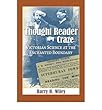Pasulka, who is a professor of religious studies at the University of North Carolina, regards the belief in UFOs as a ‘nascent religiosity’ and that the perception of the subject is mediated and manipulated by the media and unnamed agents of disinformation.
🔽





















